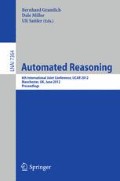Abstract
Combination of theories underlies the design of satisfiability modulo theories (SMT) solvers. The Nelson-Oppen framework can be used to build a decision procedure for the combination of two disjoint decidable stably infinite theories.
We here study combinations involving an arbitrary first-order theory. Decidability is lost, but refutational completeness is preserved. We consider two cases and provide complete (semi-)algorithms for them. First, we show that it is possible under minor technical conditions to combine a decidable (not necessarily stably infinite) theory and a disjoint finitely axiomatized theory, obtaining a refutationally complete procedure. Second, we provide a refutationally complete procedure for the union of two disjoint finitely axiomatized theories, that uses the assumed procedures for the underlying theories without modifying them.
Access this chapter
Tax calculation will be finalised at checkout
Purchases are for personal use only
Preview
Unable to display preview. Download preview PDF.
References
Althaus, E., Kruglov, E., Weidenbach, C.: Superposition Modulo Linear Arithmetic SUP(LA). In: Ghilardi, S., Sebastiani, R. (eds.) FroCoS 2009. LNCS, vol. 5749, pp. 84–99. Springer, Heidelberg (2009)
Barrett, C., Sebastiani, R., Seshia, S.A., Tinelli, C.: Satisfiability modulo theories. In: Biere, A., Heule, M.J.H., van Maaren, H., Walsh, T. (eds.) Handbook of Satisfiability. Frontiers in Artificial Intelligence and Applications, vol. 185, ch. 26, pp. 825–885. IOS Press (February 2009)
Baumgartner, P., Tinelli, C.: Model Evolution with Equality Modulo Built-in Theories. In: Bjørner, N., Sofronie-Stokkermans, V. (eds.) CADE 2011. LNCS, vol. 6803, pp. 85–100. Springer, Heidelberg (2011)
Bonacina, M.P., Ghilardi, S., Nicolini, E., Ranise, S., Zucchelli, D.: Decidability and Undecidability Results for Nelson-Oppen and Rewrite-Based Decision Procedures. In: Furbach, U., Shankar, N. (eds.) IJCAR 2006. LNCS (LNAI), vol. 4130, pp. 513–527. Springer, Heidelberg (2006)
Bonacina, M.P., Lynch, C., de Moura, L.: On Deciding Satisfiability by DPLL(\(\Gamma+{\mathcal T}\)) and Unsound Theorem Proving. In: Schmidt, R.A. (ed.) CADE 2009. LNCS, vol. 5663, pp. 35–50. Springer, Heidelberg (2009)
Fontaine, P.: Combinations of Theories for Decidable Fragments of First-Order Logic. In: Ghilardi, S., Sebastiani, R. (eds.) FroCoS 2009. LNCS, vol. 5749, pp. 263–278. Springer, Heidelberg (2009)
Fontaine, P., Gribomont, E.P.: Combining non-stably infinite, non-first order theories. In: Ahrendt, W., Baumgartner, P., de Nivelle, H., Ranise, S., Tinelli, C. (eds.) Selected Papers from the Workshops on Disproving and the Second International Workshop on Pragmatics of Decision Procedures (PDPAR 2004). ENTCS, vol. 125, pp. 37–51 (July 2005)
Ge, Y., de Moura, L.: Complete Instantiation for Quantified Formulas in Satisfiabiliby Modulo Theories. In: Bouajjani, A., Maler, O. (eds.) CAV 2009. LNCS, vol. 5643, pp. 306–320. Springer, Heidelberg (2009)
Nelson, G., Oppen, D.C.: Simplifications by cooperating decision procedures. ACM Trans. on Programming Languages and Systems 1(2), 245–257 (1979)
Tinelli, C., Harandi, M.T.: A new correctness proof of the Nelson–Oppen combination procedure. In: Baader, F., Schulz, K.U. (eds.) FroCoS, Applied Logic, pp. 103–120. Kluwer Academic Publishers (March 1996)
Tinelli, C., Ringeissen, C.: Unions of non-disjoint theories and combinations of satisfiability procedures. Theoretical Computer Science 290(1), 291–353 (2003)
Tinelli, C., Zarba, C.G.: Combining non-stably infinite theories. Journal of Automated Reasoning 34(3), 209–238 (2005)
Wies, T., Piskac, R., Kuncak, V.: Combining Theories with Shared Set Operations. In: Ghilardi, S., Sebastiani, R. (eds.) FroCoS 2009. LNCS, vol. 5749, pp. 366–382. Springer, Heidelberg (2009)
Zarba, C.G., Manna, Z., Sipma, H.B.: Combining theories sharing dense orders. In: TABLEAUX, Position Papers and Tutorials, pp. 83–98 (2003), Technical Report RT-DIA-80-2003
Author information
Authors and Affiliations
Editor information
Editors and Affiliations
Rights and permissions
Copyright information
© 2012 Springer-Verlag Berlin Heidelberg
About this paper
Cite this paper
Fontaine, P., Merz, S., Weidenbach, C. (2012). Combination of Disjoint Theories: Beyond Decidability. In: Gramlich, B., Miller, D., Sattler, U. (eds) Automated Reasoning. IJCAR 2012. Lecture Notes in Computer Science(), vol 7364. Springer, Berlin, Heidelberg. https://doi.org/10.1007/978-3-642-31365-3_21
Download citation
DOI: https://doi.org/10.1007/978-3-642-31365-3_21
Publisher Name: Springer, Berlin, Heidelberg
Print ISBN: 978-3-642-31364-6
Online ISBN: 978-3-642-31365-3
eBook Packages: Computer ScienceComputer Science (R0)

